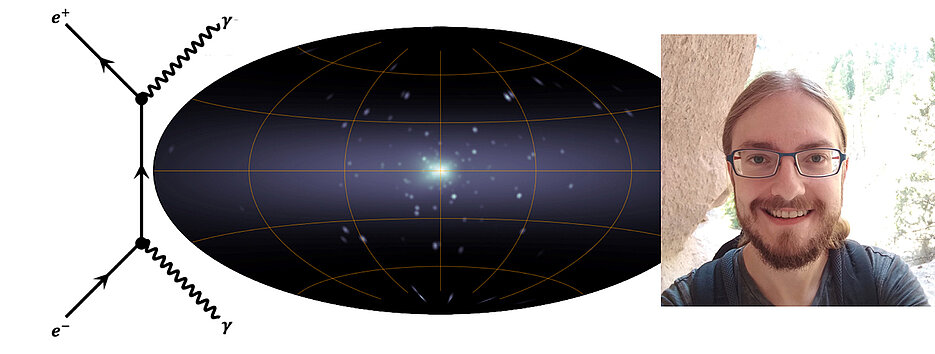Prize for Thomas Siegert
08/24/2022The Würzburg researcher Dr. Thomas Siegert receives an award from the German Astronomical Society. He is being honoured for his work on astrophysics with antimatter particles.

Every year, the German Astronomical Society (AG) honours outstanding young scientists with the Ludwig Biermann Award. The prize is endowed with 3,000 Euros and goes to Dr Thomas Siegert, junior research group leader at the Chair of Astronomy at Julius-Maximilians-Universität (JMU) Würzburg.
The young scientist will receive the award in September 2022 at the AG meeting in Bremen. He has also been invited to give a lecture on his work there.
"Thomas Siegert is internationally recognised in nuclear astrophysics," the laudation says. He contributed to numerous publications and is known as an expert in the data analyses of the INTEGRAL/SPI instrument of the European Space Agency ESA. This instrument measures the gamma radiation that is produced in the Milky Way when matter annihilates with antimatter.
Tracking down the origin of antimatter
Antimatter particles are very rare on Earth. They can only be produced here by particle accelerators or radioactive decays and only for a very short time. Their main characteristic is that they have an opposite charge to their matter partners. As soon as they get too close to their partners, they transform their entire mass into radiation. This gamma radiation has a much higher energy than X-rays.
"The question of my work is where in the Milky Way the enormous amounts of antimatter in the form of positrons come from. These are the antimatter partners of the electrons," says the JMU researcher.
Thomas Siegert was able to show that there must be more than one answer to this: New radioactive elements formed during the evolution of massive stars or during stellar explosions are not sufficient as an explanation on their own.
He has proven that microquasars play a role here – these are small black holes that accumulate mass from a companion star and shoot elementary particles into the universe in so-called jets. In this way, a considerable amount of antimatter can be created. Millions of years later, these positrons then annihilate with electrons and produce the measured gamma rays.
Career of the prizewinner
Thomas Siegert, born in 1988 in Berlin and raised in the Bavarian Forest, studied physics at the Technical University of Munich. He completed his doctorate there in 2017 in collaboration with the Max Planck Institute for Extraterrestrial Physics (MPE) in Garching and went to the USA in 2019. In San Diego, he worked on NASA's COSI instrument with a research grant from the German Research Foundation (DFG).
In 2021, he returned to Germany with a DFG stipend. After an interim stay in Würzburg, he worked as a mission support scientist for the INTEGRAL satellite at MPE. Since August 2022, he is now leading his own junior research group at the Chair of Astronomy at JMU.
Contact
Dr Thomas Siegert, Chair of Astronomy, University of Würzburg, thomas.siegert@uni-wuerzburg.de






